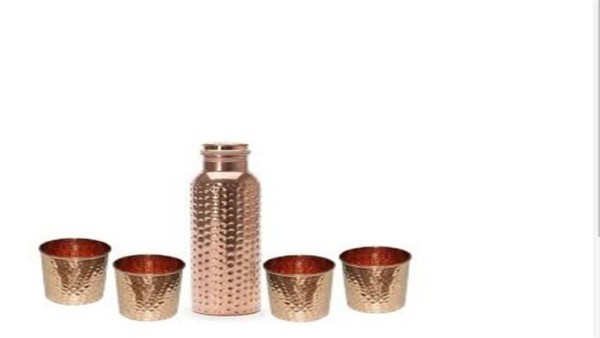Copper bottles have become increasingly popular in recent years due to their health benefits, because copper is an essential mineral that plays a role in various bodily functions, including red blood cell production, bone health, and connective tissue formation.

However, there have been concerns raised about the potential harm that copper water bottles can cause to the liver and kidneys, and it is said that excessive intake of water from copper bottles can be toxic and cause damage to the liver and kidneys, according to the "Times of India" website.
used since ancient times:
Copper utensils have been used since ancient India for cooking and serving food, and have been a part of traditional Indian and Ayurvedic practices for centuries. They are believed to have health benefits. However, it is important to note that these practices involve the use of high-quality copper vessels that are properly cleaned and maintained. The amount of copper ingested through these practices is much less than the amount consumed through drinking water from a copper bottle.
What harm can it cause?
With excessive consumption, people can experience symptoms such as nausea, vomiting, and diarrhea after drinking water from copper bottles. These symptoms may be attributed to copper toxicity, which leads to liver and kidney damage if left untreated.
What is the safe amount of copper for consumption?
According to experts, the amount of copper that can be safely consumed through drinking water from a copper bottle is about 1.3 milligrams per day. However, many copper water bottles on the market today release more copper than this amount, especially if they are not properly cleaned and maintained.
The World Health Organization (WHO) has set the maximum acceptable concentration of copper in drinking water at 2 milligrams per liter. However, some studies have shown that levels of copper in water from copper bottles are likely to exceed this limit, especially if the water has been left in the bottle for a while. a long period of time.
How do we prevent damage?
To prevent the potential harm that copper bottles can cause, experts recommend that individuals limit their daily intake of copper, and avoid using copper bottles as their only source of drinking water. They also suggest cleaning copper bottles regularly to prevent build-up of copper oxide, which increases copper levels in the water.
Conclusion:
Although drinking water from copper bottles may have potential health benefits, it is important to be aware of the potential risks of copper toxicity and take precautions to avoid damage to your liver and kidneys.
Experts suggest limiting daily copper intake, avoiding using copper bottles as your only source of drinking water, and making sure copper bottles are properly cleaned and maintained to prevent copper oxide build-up.



